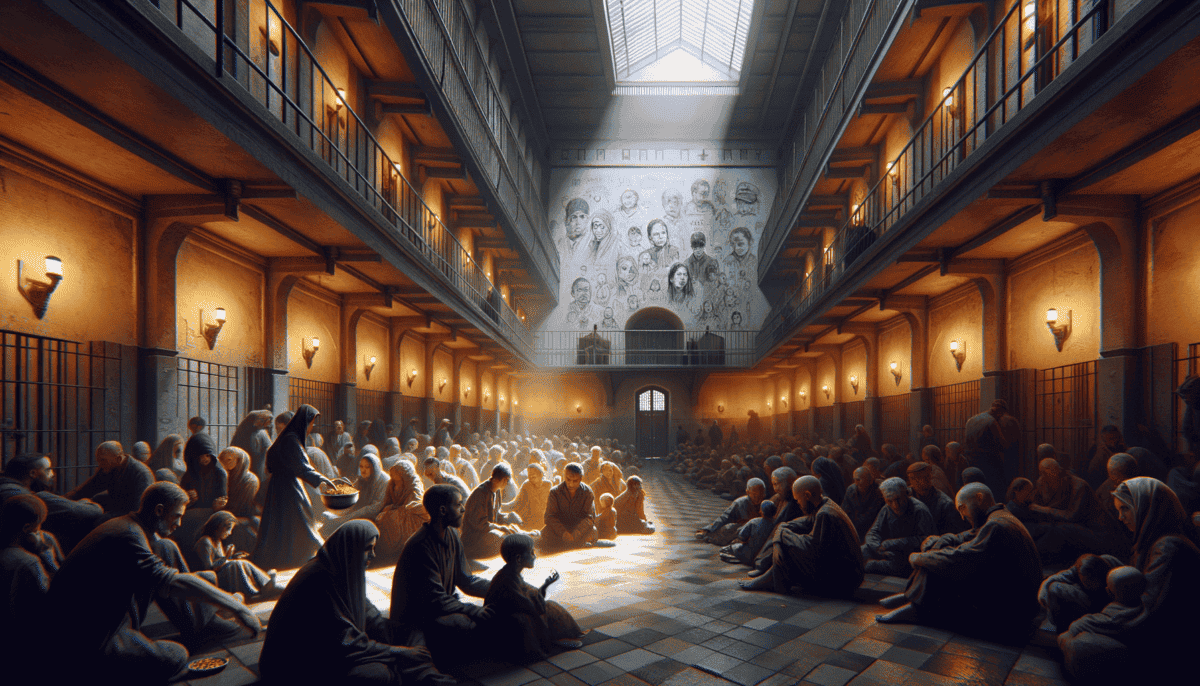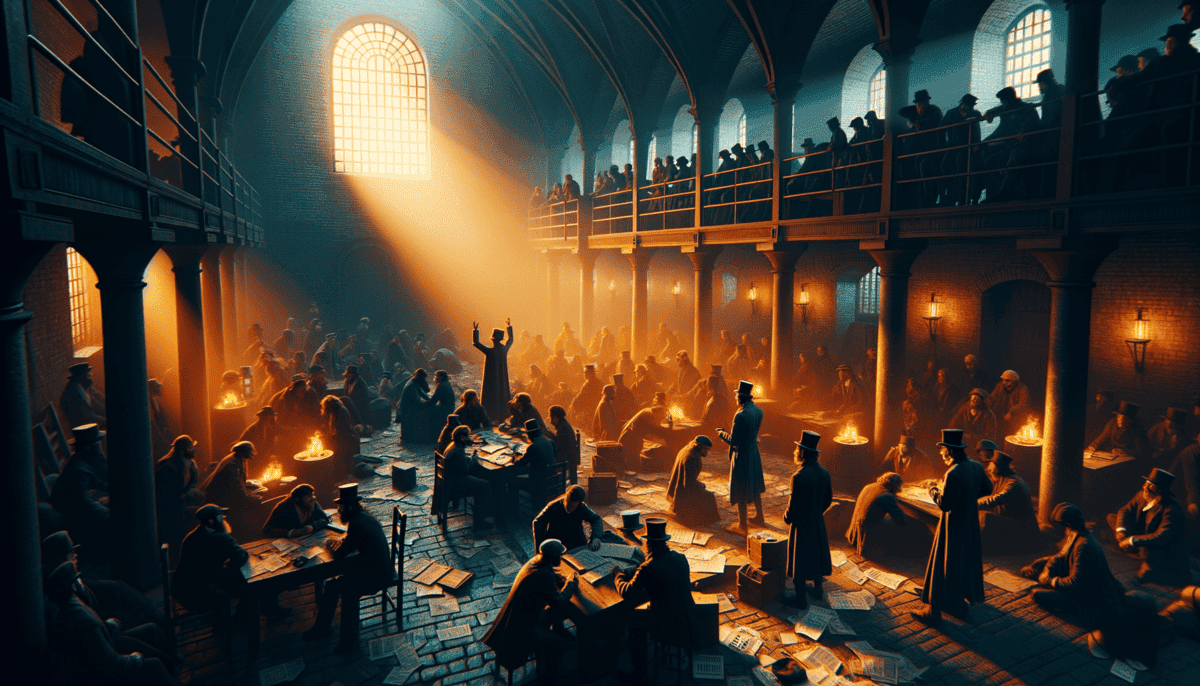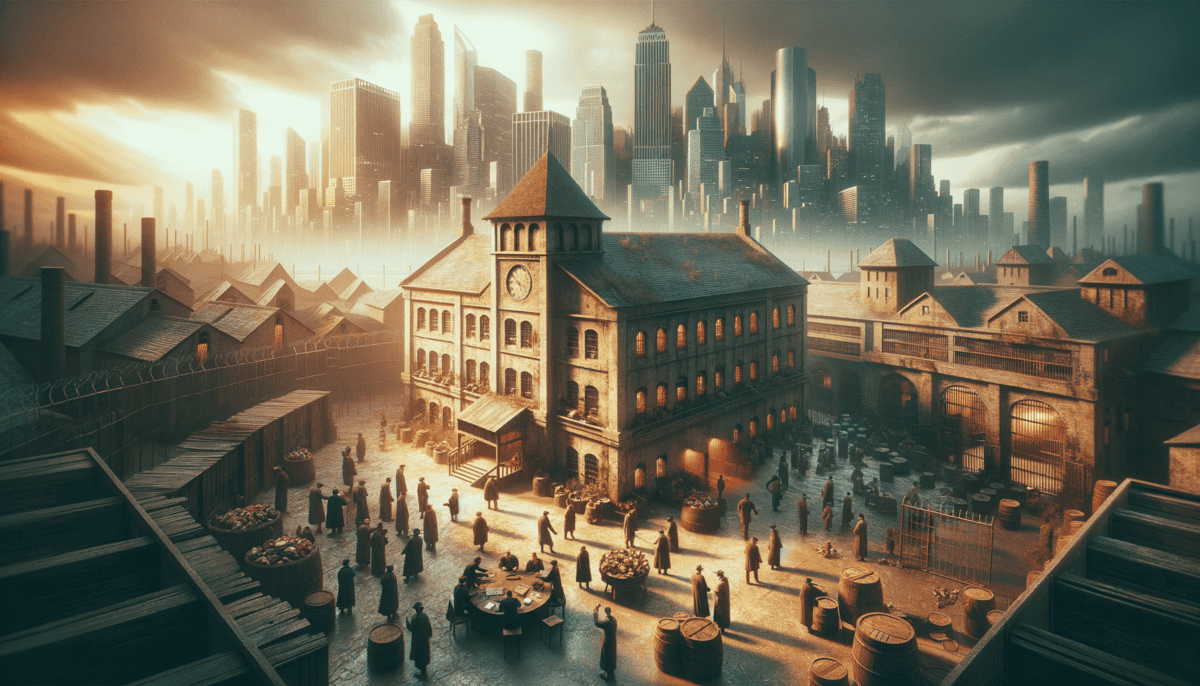Shadows of Poverty
Long ago, in a place called Medieval Europe, something very unfair happened to people who couldn't pay their bills.
Tommy was just eight years old when the guards came to take his father away. They lived in London in 1815, in a tiny house that smelled of fresh bread – his mother was a baker. That morning started like any other, until the loud knocking changed everything.
"Open up! Debt collectors!" The voices boomed through their wooden door.
Tommy's father, a carpenter who had hurt his hand and couldn't work, looked at his family with sad eyes. "I'm sorry," he whispered.
They were special jails where people were sent when they couldn’t pay money they owed. Just like when you borrow a toy and can’t give it back – except the punishment was much worse!
The streets of London were dirty and crowded. Rich people rode in fancy carriages while poor people like Tommy's family worked hard just to buy food. When someone couldn't pay what they owed, they didn't get a chance to try again – they went straight to prison!
"But Mama," Tommy asked as they watched his father being led away, "how can Papa pay money if he's locked up and can't work?"
His mother wiped her tears. "That's the sad part, dear one. He can't."
Life Gets Harder
Without his father's earnings, Tommy and his mother had to work even harder. They baked more bread than ever before, but it was never enough. Many of their neighbors faced the same problem:
- Lost their homes
- Families split apart
- Couldn't earn money
- Children left alone
“The worst thing about debtors’ prison,” Tommy’s mother would say, “is that it makes poor people even poorer.”
In the crowded streets of London, Tommy would sometimes peek through the iron gates of the Fleet Prison, where his father was held. The building was tall and dark, with tiny windows that barely let in light. Inside, people slept on cold stone floors and shared small pieces of bread.
A System That Didn’t Make Sense
Even children like Tommy could see that something was wrong. How could someone pay back money while sitting in jail? It was like telling someone to fill a cup with water while keeping their hands tied!
The rich people who made these rules lived in big houses and never worried about having enough food. They didn't understand what it was like to be poor. Some people owed as little as a few shillings – about the cost of a loaf of bread today – but still ended up in prison.
Every evening, Tommy would sit by their small window, looking at the stars and thinking about his father. He wondered about all the other families split apart by these unfair laws. The streets of London held many such stories – of mothers separated from children, of skilled workers locked away instead of being allowed to earn money to pay their debts.
Hope in Dark Times
But even in these dark times, some people started to speak up. Tommy would hear whispers in the marketplace about writers and thinkers who said these prisons were wrong. Some rich people even began to question if there might be better ways to handle debts.
As Tommy grew older, he noticed more and more people talking about change. Some said that putting people in prison for being poor was not just unfair – it was silly! After all, how could anyone expect to get their money back if the person who owed it couldn't work?
The streets of London may have been dark and dirty, but ideas about changing things were starting to shine like stars in the night sky. Tommy held onto hope that someday, no other child would have to watch their parent being taken away just because they couldn't pay their bills.
Life Behind Iron Bars
Inside the Fleet Prison, Thomas Miller – Tommy’s father – shared a tiny room with five other men. The space was no bigger than their family’s kitchen at home. Cold air whistled through cracks in the stone walls.
Morning began at dawn with the loud clanging of metal gates. Prisoners slept on straw mats on the floor. They got one small meal of bread and thin soup each day.
“Tell me about your family,” asked James, Thomas’s new friend in prison. James was a tailor who owed money for cloth he had bought.
“My Tommy is eight,” Thomas said softly. “He helps his mother bake bread. I miss the smell of it every morning.”
Famous Faces Behind Bars
Even some well-known people ended up in debtors’ prison. In the corner sat Charles Dickens’ father, John Dickens. Young Charles had to work in a factory to help his family while his father was locked up.
“We’re not bad people,” John Dickens would say. “We just had bad luck.”
The prisoners tried to make the best of their days. Some taught others to read and write. Others told stories about their lives outside. But everyone worried about their families.
Visitors’ Day
Once a month, families could visit. Tommy and his mother would bring fresh bread and clean clothes.
“Papa, I learned to make rolls all by myself!” Tommy would say, his face bright with pride.
Thomas would hug his son tight, noticing how Tommy grew thinner each visit. The boy’s shoes had holes, but they couldn’t afford new ones.
The Daily Struggle
Life in prison followed a strict schedule:
- 6 AM – Wake up call
- 7 AM – Morning count
- 12 PM – One meal served
- 8 PM – Lights out
Some prisoners were lucky enough to have family members pay for better food or a private room. But most, like Thomas, lived in the crowded common areas.
Hidden Stories
Sarah, a woman in the women’s section, wrote letters to her children every day. She had been sent to prison for owing money to her landlord. Her three small children now lived with their aunt.
“My youngest was just learning to walk when they took me away,” she told Thomas through the courtyard fence. “Now he’s running, and I’ve never seen it.”
Many children lived in prison with their parents because they had nowhere else to go. They played in dark corridors and learned to be very quiet.
The prisoners helped each other however they could. When new people arrived crying, others would comfort them. They shared their food and told stories to make the time pass.
A Growing Problem
More people came to the prison every day. A baker who couldn’t pay for flour. A farmer who had a bad year. A teacher who got sick and couldn’t work.
“The prison is getting too full,” the guards would grumble. “Soon we’ll have nowhere to put them all.”
Thomas spent his days thinking about Tommy and his wife. He worried about how they were managing without him. At night, he would look through his tiny window at the same stars Tommy watched from home.
Some prisoners gave up hope. But others, like Thomas, kept believing things would change. They had to – for their children’s sake.
Through the prison walls, they could hear the sounds of London life going on without them. Horse hooves on cobblestones. Church bells ringing. Children playing. They held onto these sounds like precious memories of the freedom they once had.
Fighting for Freedom
The year was 1818, and change was in the air. Elizabeth Fry, a kind-faced woman in simple Quaker dress, walked through the dark halls of Newgate Prison. She wasn’t afraid like most visitors. She was there to help.
She brought books, cloth for sewing, and hope to the prisoners. She believed everyone deserved a chance to learn and grow – even in prison.
“Can you teach me to read?” asked Mary, a young mother in prison for a small debt. Her eyes were bright with hope.
“Of course, my dear,” Elizabeth smiled warmly. “We’ll start today.”
Brave Hearts
All across England, people started speaking up about the unfair prison system. James Neild, a watchmaker, spent his own money to help prisoners and tell their stories to important people.
“These are not criminals,” James would say. “They are mothers, fathers, and workers who had bad luck.”
More helpers joined the fight:
- Kind church people brought food
- Lawyers worked for free ⚖️
- Writers told prison stories
- Regular folks gave money to help
Speaking Up
In Parliament, some brave leaders started asking hard questions. “Why do we lock up people who owe money? How can they pay if they can’t work?”
Thomas Howard, a rich man with a big heart, visited every prison in England. He wrote down everything wrong he saw. His notes helped make new laws to treat prisoners better.
Community Heroes
“Look what the neighbors did!” Tommy ran to his mother, waving a basket. Inside were eggs, bread, and warm mittens. The whole street helped families who had someone in prison.
Some shop owners even hired prisoners’ children so they could help their families. Tommy got a job sweeping the baker’s floor each morning before school.
People started saving money together in special clubs. If someone got in trouble with debt, the club would help them.
Brave Writers
Newspapers began printing stories about life in debtors’ prisons. People were shocked to learn how their neighbors lived behind bars.
“Did you see this?” a woman asked at the market, holding up a paper. “They put a man in prison for owing sixpence! That’s less than a loaf of bread!”
Change Begins
William started a group called “Friends of the Imprisoned.” They helped prisoners write letters to judges and important people. Some prisoners got out early because of these letters.
“Your words matter,” William told the prisoners. “Tell your story. People will listen.” ✍️
Even children joined the fight. Tommy and his friends collected pennies to help prisoners’ families. They called themselves the “Little Helpers Club.”
Growing Stronger
Every week, more people joined the fight against debtors’ prisons. They held meetings in churches and town halls. They wrote to newspapers. They talked to their neighbors.
“Remember,” Elizabeth Fry would say, “small acts of kindness can change the world.” ❤️
The movement grew stronger each day. People began to see that helping others was better than punishing them. Change was coming, slow but sure, like the sunrise after a long night.
Words That Changed Hearts
Little Charles Dickens stood outside the Marshalsea Prison gates, tears in his eyes. His father was inside, locked up for owing money. Charles was only 12, but he had to work in a factory to help his family.
“One day,” Charles whispered, “I will write stories to help people understand how wrong this is.”
Growing Up to Make Change
Years passed, and Charles grew up to be a famous writer. He never forgot those hard days when his father was in prison. He put his sad memories into wonderful stories that everyone loved to read.
“Please, sir, I want some more,” said Oliver Twist in one of Charles’s most famous books. This simple line made people think about how poor children lived.
“My stories will be a voice for those who cannot speak for themselves,” Charles would say.
Stories That Touched Hearts
In his book “Little Dorrit,” Charles wrote about a girl who grew up in a debtors’ prison. People cried when they read about her life. They started to see prisoners as real people with feelings. ❤️
Words Spark Action
Other writers joined Charles in telling prison stories:
- Maria Edgeworth wrote about poor families
- William Thackeray shared true prison tales
- Elizabeth Gaskell showed how debt hurt workers ✍️
- Thomas Hood wrote poems about poor people
“Look what Charles Dickens wrote!” people would say at breakfast, reading their newspapers. “We must do something to help!”
Changing Minds
Rich people who read these stories started visiting prisons. They were shocked by what they saw. Many decided to help change things.
Books and newspapers helped people understand why debtors’ prisons were wrong better than any speech or law.
“My mother read me Oliver Twist,” said Tommy to his friend. “Now I know why we must help prisoners’ families.”
Pictures Tell Stories Too
Artists drew pictures of life in debtors’ prisons. These pictures appeared in books and newspapers. Sometimes one picture could say more than a thousand words.
“See how sad the children look?” people would say, pointing to the drawings. “We cannot let this continue.”
Words Travel Far
Charles’s books were read all over the world. People in America, France, and other places learned about debtors’ prisons through his stories.
“If Charles Dickens can speak up,” said a young writer in America, “so can I!” Many new writers began telling stories about poor people in their own countries.
Hope Through Stories
Every new book and newspaper story was like a small hammer, chipping away at the walls of debtors’ prisons. People began to imagine a world without these cruel places.
Charles never stopped writing about social problems. Even when he was very famous, he remembered being that sad little boy outside the prison gates. His words gave hope to poor people everywhere. ⭐
The power of stories was changing the world, one reader at a time. Books were doing what laws and arguments couldn’t – they were changing people’s hearts.
Victory for Justice
The year was 1869. People gathered outside Parliament in London. Something big was about to happen! After years of fighting, a new law would end debtors’ prisons in England forever.
“No more putting poor people in jail just because they owe money!” the crowd cheered.
The Fight for Freedom
Getting to this happy day wasn’t easy. Brave people worked hard to change the laws. Some important helpers were:
- Judges who said the old laws were wrong ⚖️
- Writers who told stories about prisoners
- Regular people who spoke up for change ✊
- Politicians who made new laws
Different Places, Same Fight
“Look what England did!” people said in other countries. “We should do that too!” Soon, many places stopped putting people in jail for owing money.
“Every person deserves to be free,” said Lord Brougham in Parliament. “Being poor is not a crime!”
Happy Families
When the prisons closed, many families got back together. Children hugged their parents. Mothers and fathers could work again to pay their bills.
New Ways to Help
Instead of prisons, people made better plans to help those who owed money:
Tommy, a baker who owed money, smiled. “Now I can keep my shop open and slowly pay what I owe,” he said. “My family won’t go hungry!”
Around the World
The good news spread everywhere. America made new laws too. France followed. Then other countries joined in. It was like a happy wave of freedom going around the world!
Almost every country decided that putting people in prison for debt was wrong.
Happy Endings
Old debtors’ prisons became museums or were torn down. Where sad prisoners once lived, gardens and parks grew. Children played where chains used to be.
“Tell us about the old days,” young people would ask their grandparents. “We’re glad things are better now!”
Learning and Growing
People learned important lessons from this time:
✨ Being kind is better than being cruel
✨ Everyone deserves a chance to make things right
✨ Working together can fix big problems
New Helpers
Special helpers called “debt advisors” started working. They taught people how to manage their money better. Banks made fairer rules about lending money.
“We’re here to help, not punish,” said Mary, a debt advisor. “Everyone can have money problems sometimes.”
Looking Forward
The end of debtors’ prisons showed that people could work together to fix unfair things. When someone needed help with money, there were now better ways to help them.
Tommy’s daughter smiled at her father working in his bakery. “I’m glad you didn’t have to go to prison, Papa,” she said. “Now we can all work together to make things better!”
The fight wasn’t over everywhere, but things were getting better. People knew that kindness and help worked better than locks and chains. A new day had come!
Modern Lessons
Today, we still think about what happened in the old debtors’ prisons. The story teaches us important things about being fair and helping others.
New Problems, Same Fight
Sarah, a teacher, tells her students about history. “We must remember these stories,” she says. “They help us make better choices today.”
Sometimes people still get in trouble with money. But now we have better ways to help:
- Special helpers who give money advice
- Banks that work with people who need more time
- Laws that protect people who owe money
- Groups that speak up when things aren’t fair ✊
Around Our World
Different countries handle money problems in different ways. Some do it well, others need to do better. But everyone agrees – no more debtors’ prisons!
“When we help each other, everyone wins,” says Maria, who helps people with money troubles.
Learning From the Past
Bobby, age 8, raises his hand in class. “Why did they put people in jail for owing money?”
“That’s a good question,” his teacher answers. “People back then didn’t know better ways to help. Now we do!”
Making Things Better
Today, we have special rules to help people who owe money:
“I lost my job and couldn’t pay my bills,” says James. “But people helped me make a plan. Now I’m doing better!”
Working Together
All around the world, people work to make money rules fair:
Judges who make fair decisions
Helper groups that give good advice
Writers who tell stories about what needs to change
Hope for Tomorrow
Little Lisa draws a picture in class. It shows people helping each other. “That’s what we should do,” she says. “Help, not hurt!”
Every person deserves a chance to fix their mistakes and make things better.
Looking Forward
The story of debtors’ prisons reminds us to be kind. When we see something unfair, we can work together to change it!
“What will you do to help others?” asks Mrs. Thompson’s second-grade class.
“We’ll be kind!” the children answer. “We’ll help people who need it!”
A Better World
The old debtors’ prisons are gone. But their story helps us remember something important: When we work together and help each other, we all do better! ⭐
And that’s a lesson worth remembering forever!






